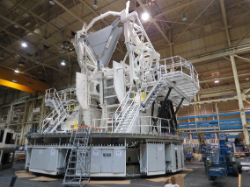University of Glasgow lends support to solar super-telescope initiative
Published: 10 February 2015
The University of Glasgow has joined a consortium of eight UK universities and associated businesses to build the cameras for a $344 million super-telescope in Hawaii.
The University of Glasgow has joined a consortium of eight UK universities and associated businesses to build the cameras for a $344 million super-telescope in Hawaii.
The Daniel K Inouye Solar Telescope (DKIST), which will make its first observations in 2019, is being constructed by the US National Solar Observatory on Haleakala mountain in Maui, Hawaii. With a four-metre diameter main mirror, the telescope will be able to image the Sun in unprecedented detail, equivalent to examining a £1 coin from 100 km away.

DKIST will address fundamental questions at the core of contemporary solar physics. It will do this via high-speed (sub-second) imaging, spectroscopic and magnetic measurements of the solar photosphere, chromosphere and corona. DKIST will be mainly funded by the US National Science Foundation.
Professor Lyndsay Fletcher of the University of Glasgow’s School of Physics and Astronomy is a member of the DKIST Science Working Group. Professor Fletcher said: "DKIST will advance our understanding of all aspects of our nearest star, but its emphasis on high-speed imaging and magnetic field measurements make it particularly well-suited to investigating solar flares.
“These are dramatic, high-energy events on the Sun, caused by the release of energy stored in its magnetic field. They produce intense flashes of radiation, and are often associated with the eruption away from the Sun of 'prominences' - gas magnetically suspended in the solar atmosphere.
“The radiation and eruptions can both prove hazardous for our technological society. In Glasgow we have long-standing leadership in the theory and observation of solar flares, so we are very excited at being involved in the DKIST consortium and working with the new data that the telescope will provide in the future."
Professor Mihalis Mathioudakis of the Astrophysics Research Centre at Queen’s University Belfast, Principal Investigator of the UK consortium, said: “Scientific discoveries demand technological innovation and play a major role in economic growth. DKIST will be a revolutionary instrument for ground-based solar physics, which is a growth area in the UK. It will be in a position to explore key questions regarding solar magnetic field generation and dissipation, solar variability, atmospheric structure and dynamics. Our consortium will deliver key equipment that will allow DKIST to achieve these scientific goals.”
DKIST Director, Dr Thomas Rimmele said: “We are excited to have the UK consortium on board as partners. DKIST will be the world's most powerful solar telescope. The scientific and technological expertise represented by the Queen's University Belfast-led consortium is a great asset to the project.”
The consortium of UK institutes in DKIST is led by Queen's University Belfast and includes Armagh Observatory, Northumbria University, University College London, and the Universities of Glasgow, Sheffield, St. Andrews and Warwick. The consortium will partner with Belfast company and Queen’s University spinout Andor Technology and the Science and Technology Facilities Council. The consortium will oversee the development and delivery of the cameras, and take the lead in supporting the UK solar physics community in their use of DKIST by providing a set of processing tools for DKIST data, synthetic observations to validate diagnostic approaches, and support for developing observing proposals.
First published: 10 February 2015
<< News

